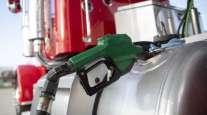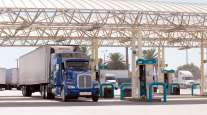Senior Reporter
Rep. Bill Shuster Not Ruling Out Fuel-Tax Increase

WASHINGTON — The top Republican transportation policymaker in the House of Representatives did not rule out raising the federal fuel tax to fund infrastructure projects, giving momentum to a view recently shared by President Donald Trump and endorsed by much of the freight industry.
Rep. Bill Shuster (R-Pa.), chairman of the influential Transportation and Infrastructure Committee, explained on Feb. 28 that the fuel tax is the politically conservative approach to paying for highway infrastructure projects, and pledged to schedule hearings on infrastructure policy legislation prior to the August congressional recess.
“It’s a user fee. And as a conservative Republican, I believe if you use something, you ought to pay for it. And, again, we haven’t really touched this in 25 years,” Shuster, who is not seeking reelection, told an audience at the American Association of State Highway and Transportation Officials annual conference here.
His sentiment comes about two weeks after lawmakers meeting with Trump at the White House said the president endorsed a 25-cents-per-gallon fuel-tax increase. Shuster appears determined to press ahead on the fuel-tax increase, even though Republicans, such as his Senate counterpart John Barrasso (R-Wyo.), were quick to push back.
“This has to be presidential leadership. The president has to be out there on a weekly basis talking about it — going around the country,” he added, emphasizing the need to quickly advance an infrastructure funding package in order to ensure the federal Highway Trust Fund’s solvency. “If we don’t deal with it now, the trust fund runs out of money in October 2020.”
.@RepBillShuster three things that must be in #Infrastructure package: bipartisanship, realistic funding, forward thinking. pic.twitter.com/pdYvPdz57v — AASHTO (@aashtospeaks) February 28, 2018
On Feb. 12, the White House unveiled legislative “principles” for infrastructure funding calling for $200 billion to leverage nonfederal investments to achieve $1.5 trillion over 10 years. Of that, $50 billion would be used for rural projects. The proposal would streamline the construction permitting process. However, it would not address the Highway Trust Fund’s impending insolvency.
Rep. Peter DeFazio (D-Ore.), the transportation panel’s ranking member, has been highly critical of the president’s legislative “principles” on infrastructure funding. At the AASHTO conference, he applauded Trump’s stance on the fuel tax. Other Democrats also have signaled support for a fuel-tax increase.
“I’ll stand next to [Trump] if he goes for a quarter,” DeFazio said.
Barrasso would not. “It’s a nonstarter for me,” the senator told reporters after his talk at AASHTO ahead of Shuster.
The federal gas tax is 18.4 cents per gallon, while the diesel tax is 24.4 cents per gallon. Those rates, set in 1993, are no longer sufficient to keep the Highway Trust Fund solvent. The fund’s authority expires in less than three years. It is backed primarily by revenue from the fuel excise tax.
The conference took place a day after remarks by Sen. John Cornyn (R-Texas), the chamber’s majority whip, who doubted whether the Senate would be able to take up an infrastructure bill this year, according to multiple reports.
AASHTO is among the stakeholders that continue to call on policymakers to advance a sustainable infrastructure funding bill. Raising the fuel tax has been endorsed by the U.S. Chamber of Commerce, the American Society of Civil Engineers, labor groups and the trucking industry. More than two dozen states recently raised their fuel taxes, citing federal inaction on long-term transportation funding.




